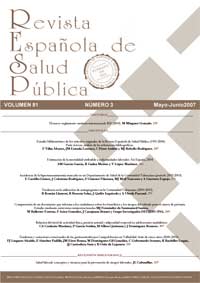Relationship between child day-care attendance and acute infectious disease. A systematic review
Abstract
Child day-care attendance is considered to be an acute early childhood disease risk factor, the studies available however not affording the possibility of fully quantifying this risk. A systematic review of clinical trials and cohort studies was conducted, in which the effects child day-care attendance had on the health of young children based on the Cochrane Collaboration, PubMed and Spanish Medical Index databases, without any time or language-related limits, were analyzed and rounded out with analyses of referenced works and an additional EMBASE search. The methodological quality was evaluated by means of personalized criteria. Pooling measures (relative risks, incidence density ratios and weighted mean differences) were calculated with their confidence intervals, assuming random effects models. A significant increase was found to exist of a risk consistent over time and among different social and geographical environments. Considering the most ethodologically-stringent studies with adjusted effect estimates, child day-careattendance was related to an increased risk of upper respiratory tract infection (RR=1,88), acute otitis media (RR=1,58), otitis media with fluid draining (RR=2,43), lower respiratory tract infections (overall RR=210; acute pneumonia RR=1.70; broncholitis RR=1,80; bronchitis RR=2,10) and gastroenteritis (RR=1,40). Child day-care attendance could be responsible for 33%-50% of the episodes of respiratory infection and gastroenteritis among the exposed population. In conclusion, it can be said that the risk for childhood health attributable to the child day-care attendance is discreet but of high-impact. This information has some major implications for research, clinical practice, healthcare authorities and society as a whole.Downloads
Published
2008-03-14
Issue
Section
SISTEMATICS REVIEWS

